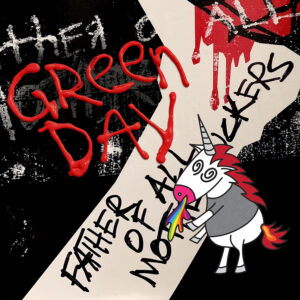
The uncensored version of the album cover lacks the unicorn.
Ollie Gratzinger | Editor-in-Chief
02/13/20
California rock band Green Day is back with its thirteenth studio album Father of All…, released on Feb. 7. With punchy guitars and lyrics charged with political exhaustion, the album sounds like a pop-punk tribute to a society wrought with panic.
If Green Day set out to make a statement, it certainly made it, with a big middle finger to the establishment and a blatant disregard for the status quo. This is, after all, a group that (almost ironically) gained mainstream popularity for its rebellious attitude and indifference toward industry expectations.
Father of All… takes the political musings of its earlier predecessors Revolution Radio (2016), 21st Century Breakdown (2009) and rock opera American Idiot (2005) and turns them on their heads; this record isn’t about political resistance, but rather the depressed ambivalence that comes after you’ve resisted so hard for so long and nothing has even begun to budge.
However, if the band set out to make a memorable album with hits comparable to Dookie’s “Basket Case,” Nimrod’s “Good Riddance (Time of Your Life)” or American Idiot’s “Boulevard of Broken Dreams,” Father of All… has almost certainly missed its mark.
What it says, it says loudly; society is very, very broken, and it’s easy to feel overwhelmed by the constant onslaught of tragic headlines in the news. “Sugar Youth’’ and “I Was a Teenage Teenager” detail the anxieties of growing up in a hopeless world, while “Junkies on a High” and the titular “Father of All” chronicle the drug-infused experiences of burnt out characters with no craps left to give. With these elements hard at work, Father of All… is an album with frayed nerves in the midst of a manic breakdown. Conceptually, this is pretty cool and objectively relevant. But unsurprisingly, it doesn’t necessarily translate to good music.
There’s no respite from rushed, feverish and often hard-to-understand lyrics and high-intensity drums; while this helps the listener understand the hectic emotions it’s trying to convey, it doesn’t really make for the kind of music most people would feel compelled to hum along to. No song stands out as iconic, memorable or otherwise better than all the rest, and no lyric is especially profound or meaningful. It’s got the rage of American Idiot’s protagonist St. Jimmy and the disordered chaos of 2012’s UNO… DOS… TRÉ!, but it lacks the heart.
The closest Father of All… comes to saying something meaningful is in the album’s final track, “Graffitia.” This song is stylistically different from the rest of the album, and it sounds more like Green Day than the rest of the record, which tends to echo either late Fall Out Boy or early Fitz and the Tantrums.
There’s a line in “Graffitia” that talks about police brutality and the shooting of a young black man, whereas the rest of the album focuses on the party scene, drug abuse and unhealthy romance. “Oh Yeah,” too, mentions bulletproof backpacks and our society’s obsession with social media, and like “Graffitia,” it feels like a welcomed outlier on an otherwise unoriginal album. Still, neither song feels strong enough musically to outlive the recent release hype.
Father of All… pales in comparison to Green Day’s past fame. It feels more like a failed attempt at a return to punk roots than a reactive piece of art inline with the band’s earlier achievements. It makes a powerful statement about what a society at its wits end can look like, but it lacks the driving musicality that made Green Day a cult classic and crafted anthems that defined a generation.
Father of All… is a rage-filled dance party, but when that party ends, there’s nowhere left for it to go.



